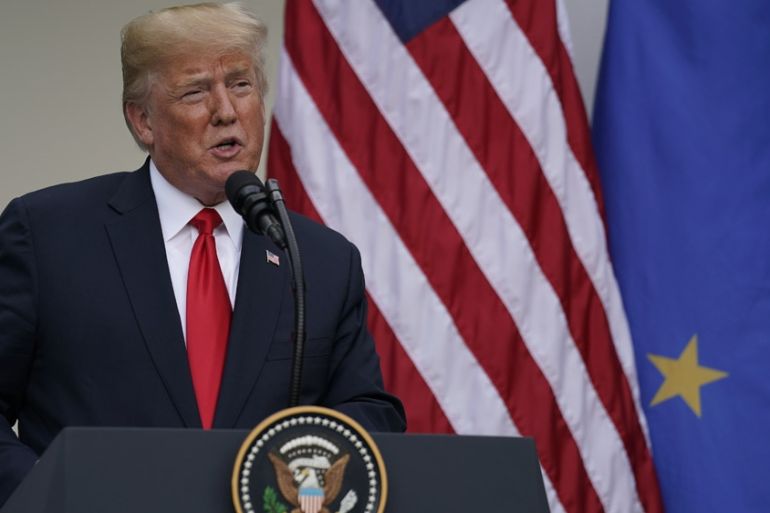Trump postpones tariff decision on car imports
White House announces six-month delay to give trade negotiators time to reach agreement with EU, Japan.

United States President Donald Trump has decided to wait up to six months before determining whether to impose a 25 percent tariff on imported cars and parts from the European Union and Japan. This gives trade talks more time for the US to make a deal.
The White House had faced a Saturday deadline to make a decision on US Commerce Department recommendations to protect the domestic auto industry from foreign imports on national security grounds.
Keep reading
list of 4 itemsOne of the biggest hurdles for athletes on the Olympic path: Money
Key takeaways from Xi Jinping’s Europe trip
When will EVs become mainstream in the US?
In addition to averting domestic pain, delaying the decision avoids what was shaping up to be a new dramatic escalation in the Trump administration’s trade disputes around the world – including its trade war with China.
But now Trump is directing US Trade Representative Robert Lighthizer to pursue further negotiations and report back within 180 days. If those discussions are unsuccessful, Trump will then decide “whether and what further action needs to be taken”.
In a proclamation released on Friday, Trump said he agreed with a Commerce Department Study that found some imported cars and trucks are “weakening our internal economy” and threatening to harm national security.
“Important innovations are occurring in the areas of engine and powertrain technology, electrification, lightweighting, advanced connectivity, and autonomous driving,” said the proclamation. “The United States defence industrial base depends on the American-owned automotive sector for the development of technologies that are essential to maintaining our military superiority.”
Fierce opposition
Trump’s proclamation said “domestic conditions of competition must be improved by reducing imports”. But auto tariffs face strong resistance from both parties in Congress, to whom Trump has not released the “Section 232” investigation report.
Automakers have strongly opposed the tariffs, arguing they would raise prices, threaten hundreds of thousands of US jobs, and decrease industry spending on self-driving cars.
The administration cited statistics that show US-owned companies now account for a far smaller share of the total US automobile market than they used to, comprising 67 percent of the market in 1985 (10.5 million units) versus 22 percent (3.7 million units) in 2017.
During the same time period, the administration said, imports nearly doubled, from 4.6 million units to 8.3 million units. Trump’s decision could impact some 47 billion euros ($53bn) worth of car and auto part exports.
US Commerce Secretary Wilbur Ross told Trump that “successful negotiations could allow American-owned automobile producers to achieve long-term economic viability and increase R&D spending to develop cutting-edge technologies that are critical to the defence industry”.
But many “foreign” cars are made on US soil by American workers using US parts, and so the foreign-car distinction is often blurry.
Toyota Motor Corporation has said the tariffs “threaten US manufacturing, jobs, exports, and economic prosperity”.
General Motors last year warned that import tariffs could hurt workers and lead to a “a smaller GM” while isolating US businesses from the global market.
‘You can’t have both’
The Alliance of Automobile Manufacturers, a trade group representing Toyota, General Motors and others, said that companies remain “deeply concerned that the administration continues to consider imposing auto tariffs”.
The group said that since 2017, automakers have invested $22.8bn in new and existing facilities in the US, but “increased auto tariffs threaten to undo this economic progress. At the end of the day, you can have tariffs or investment, but you can’t have both”.
Trump had agreed last July not to impose punitive tariffs on imports of EU cars as both sides looked to improve economic ties.
Meanwhile, EU steel and aluminium makers remain subject to punitive US import tariffs. The measures, also based on concerns about national security, prompted EU countermeasures, with increased tariffs on motorbikes and other US products.
At the same time, Europe has also engaged in talks with the US and Japan to rewrite global trading rules to limit state subsidies and forced technology transfer, with eyes clearly on China.
And though future car tariffs might not send the EU rushing to Beijing, they could undermine efforts to bring US allies on board with China trade policies.